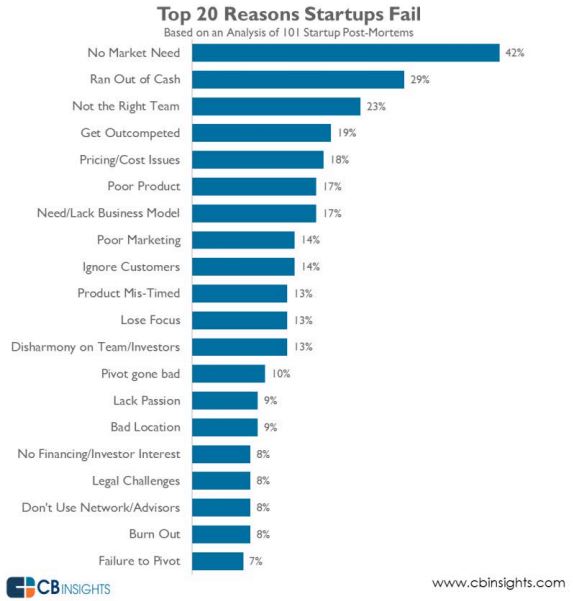Startups… It seems like everyone’s trying to break into the market on their own these days.
The growing desire of millennials to “work for themselves” is causing the global emergence of over 305 million startups each year. This entrepreneurial trend doesn’t appear to be going away anytime soon as most millennials are reaching their 30s, which happens to be the age when most entrepreneurs emerge.
For the economy and product innovation, this trend is just awesome. The continual influx of new business means that us consumers are benefiting from various new technologies and the practical nature of competitive markets (better prices). But that doesn’t take into account one of the most compelling statistics about startups:
Over 50% of startups fail within the first four years.
Surprised? Maybe you were expecting a number closer to 80% or 90%? Well, you might be right. But the Washington Post thinks otherwise. It all comes down to what the criteria for eligibility is.
I’ll let you in on something – if you look it up right now, you’ll probably get a bunch of contradicting statistics about what percentage of startups end up failing. Some say it’s 90%, others say it’s more. Some experts, on the other hand, have chosen to rebut these statements, claiming that the figure is actually around 50%.
So in reality, the numbers vary (by a significant amount), reason being that the terms “startup” and “fail” are hard to define. What exactly makes a startup? A company with less than a certain number of employees? A new company that’s profit-driven? And what does a failure consist of? Does the company have to be shut down? Does selling the company count as a failure?
There are too many variables and we haven’t quite come up with standardized models to measure these numbers. Naturally, there will be different opinions, but no one’s arguing with Statistic Brain when they say that the actual number of startups that fail in the US is about 50%. So for all intents and purposes, let’s just agree with them.
Why Startups Fail
It’s logical to think that startups have a higher chance of failure than more established businesses. After all, they have less experience within the market, they have less available resources, and they’ve had less time to build up a loyal customer base. But many emerging startups still manage to disrupt entire industries and steal market share from far more established companies (think Uber and AirBnB). What are they doing that the other 50% aren’t?
According to CBInsights, the biggest factor by a long shot (42%) is that there isn’t a market need for the product offering. Either that or they weren’t able to build enough demand to maintain growth. The next biggest reason why startups fail (29%) is because they run out of cash. Although that’s truly a legitimate reason, it’s usually just a symptom of another problem – “stupid spending” or not generating enough capital in the first place.

Bottom line, it’s hard out there for a startup. On top of all the mentioned issues, they still have to address core functions like production, HR, and R&D. It may seem pretty overwhelming but I can assure you, it’s not impossible. Circumstances just mean startups have to be smart about what functions and strategies they invest in. Well, at least smarter than competing companies with bigger budgets.
Background
As a marketing agency, Spiralytics deals with a wide range of clients, many of whom are startups or in their early years of operation. So, we come across these startup challenges on a regular basis. Sometimes, it can get a little daunting because every startup faces a set of unique challenges that are specific to their circumstances, and they all require different tactics to address.
In my experience, when it comes to addressing new challenges, a great “hack” is to leverage the expertise of established trailblazers (pioneers in the marketing industry). In this case, I was lucky enough to connect with Rafi Chowdhury on Twitter. Being the serial entrepreneur that he is, I had to ask for his insights.

Despite only being in his mid twenties, Rafi’s already managed to secure a foothold in the digital marketing industry and build a highly-respected name for himself. As the founder/co-founder of four startup businesses (one of which being a growth hacking consultancy), he’s experienced more than his fair share of growing companies from scratch.
So I took the opportunity to pick his brain about common startup marketing challenges and how he’s managed to not only address them, but turn them into opportunities for learning and development. Here’s what he had to say:
Rafi Chowdhury: Addressing Startup Challenges
1. Startups and small businesses usually have teams that are highly cross-functional (CEOs can do operations, HRM, marketing, and sales all in the same day). How can they make sure that marketing requirements get the attention they deserve?
Marketing depends on how much the business is struggling or how well it is doing. If you want to grow as a business you have to spend money. It is pretty simple. Having a dedicated person or team for marketing helps 🙂
2. Bootstrapped startups and small businesses will always have less resources (budgets/people) than established brands to invest in marketing. How can they be more wise about spending (considering the fact that they have no historical marketing data)?
Cheap outsourced labor, partnerships, and influencer marketing. You don’t need that much money to do effective marketing online since most of it is just rinsing and repeating the same process over and over.
Virtual assistants, college students, recent college grads can all be utilized, cost-effectively to implement most of the basic stuff needed to have an effective online marketing strategy. But, you have to make sure that someone experienced is directing the team(s).
3. For newer businesses with less marketing knowledge and experience, what would you say is the most important key to “leveling up” their capabilities?
Consulting with experienced marketers and also looking at competition to see what they are doing and trying to implement the same tactics. Also, hiring cheap and outsourced labor force to increase bandwidth is not a bad strategy at all.
4. New brands can find it extremely difficult to build trust amongst their target audiences. What’s the best way to position yourself as a brand people can rely on?
Educate your audience. If you keep educating them, they will eventually buy from you. Also, partner with brands who you can work with in parallel. Partnering with established brands is a big hack. The other thing you can do is lots of influencer marketing. Reach out to people who are huge influencers and get them to partner with you or give you their endorsements.
5. In the digital age, there’s no doubt that a brand’s online visibility is critical. For a small business with no significant digital footprint, what’s your secret to getting your brand in front of the right people initially?
Influencer marketing and partnerships. They already have the audience, so figure out a way to make a win-win situation where you can tap into their audience base. For example, when I started blogging, I constantly guest posted to try to get attention from my audience on other people’s blogs.
6. There are hundreds of options when it comes to choosing various marketing software for a small business. How did you choose and develop your marketing software portfolio?
When I had need to do a certain thing, I started searching on the internet and started asking people. I would hire freelancers who also told me about many of these softwares. Talking to freelancers will really teach you a lot. I was always very good at always asking questions until I got some answer or found a hack for something.
7. Businesses that don’t keep up with industry changes will find it hard to compete effectively. What would you recommend for startups and small businesses to keep up with the latest marketing trends and technologies?
Talk to your customers and ask them and listen. Read top industry publications. Sign up or buy from your top competitors so you know what they are doing.
8. The scope of digital marketing is huge. How can startups and small businesses choose the most appropriate channels to focus on?
Look at the close top competitors and see what is working for them and try it. If it does not work then try something else until you figure out what works.
9. It’s imperative that startups and small businesses truly understand their audiences so that marketing efforts are highly targeted and efficient. Starting out, what would you say is the best way to figure out who you’re trying to reach?
Surveys and by looking at your competition. You can easily get validation if you can find existing companies that are doing similar things as you and it is working for them. I find this to the best solution in most cases. Otherwise, you need to ask your customers what they want to buy and get ideas from that. Taking a lean approach is better than building something no one wants to buy.
10. What’s your biggest piece of advice for startups and small businesses when it comes to competing against larger, more established businesses?
Look at the company reviews and try to identify pain points they are trying to solve. See what the most common complaints from customers are. If you can find things which are consistently being brought up by customers, you can target those pain points and build a product or provide a service that aims to resolve those pain points.
Those would essentially be your selling points which you can use to distinguish yourself from larger competition. This is something you can advertise to your customers when they ask why they should buy from you and not the more established brands.
Key Takeaways
Rafi made some great points, but these really struck home for me:
- “If you want to grow as a business you have to spend money.”
It’s tough for startups to invest in marketing when they’re also trying to save up for R&D. Developing the best possible version of your product is important, but marketing should never be allowed to take a backseat unless you want sales to become stagnant.
- “You don’t need that much money to do effective marketing online.”
Not having enough resources is not an excuse to minimize digital marketing efforts. There are affordable strategies (like influencer marketing and outsourcing) that have proven to work and provide high returns. Be smart about where you invest your marketing dollars and your brand can compete in even the toughest of markets.
- “Partnering with established brands is a big hack.”
All it takes to create an influential brand advocate is the right timing and the right incentive, which is why co-branded ventures with established companies and influencers work incredibly well for startups. Although they take time to build relationships with, your efforts could really pay off in spades.
- “Talking to freelancers will really teach you a lot.”
Don’t underestimate the knowledge of freelancers and other professional contacts you meet along the way. These guys are potential goldmines for industry-specific information, so while you’ve got them at your disposal, ask away!
- “Sign up or buy from your top competitors so you know what they are doing.”
You can learn a lot about your competition by putting yourself in the shoes of their customers and checking out their brand touchpoints. They’re probably doing the same thing so you’re shooting yourself in the foot by staying “in the dark”.
- “If it does not work then try something else until you figure out what works.”
Success is usually the result of continuous trial and error. You’ll never really know what works and what doesn’t until you give it a go. When you do find something that works, stay open-minded and keep improving. There’s no such thing as a perfect strategy.
- “Taking a lean approach is better than building something no one wants to buy.”
Keep risk to a minimum by testing the waters with a Minimum Viable Product (MVP) before investing in the development of a “final” product. Only once you’ve established that a demand exists can you begin to refine your offering.
So there you have it.
Despite facing all the challenges associated with being a startup, emerging companies can compete effectively with more established industry players as long as they’re smart about what strategies, channels, and partnerships they focus on.
Also keep in mind that startups and small businesses tend to be more flexible than large corporations. Small organizations can even the playing field by taking bigger risks with the potential for better rewards. Most large organizations are just swimming in red tape and are a lot less versatile when it comes to risk-taking. Small businesses should be using risk to their advantage.
PS: To learn more about Rafi Chowdhury and what he’s up to in the world of marketing, check out his website (rafichowdhury.com) or find him on Twitter (@rafichowdhury).
Thanks for the tips Rafi! I’m sure we all learned a thing or two today.






